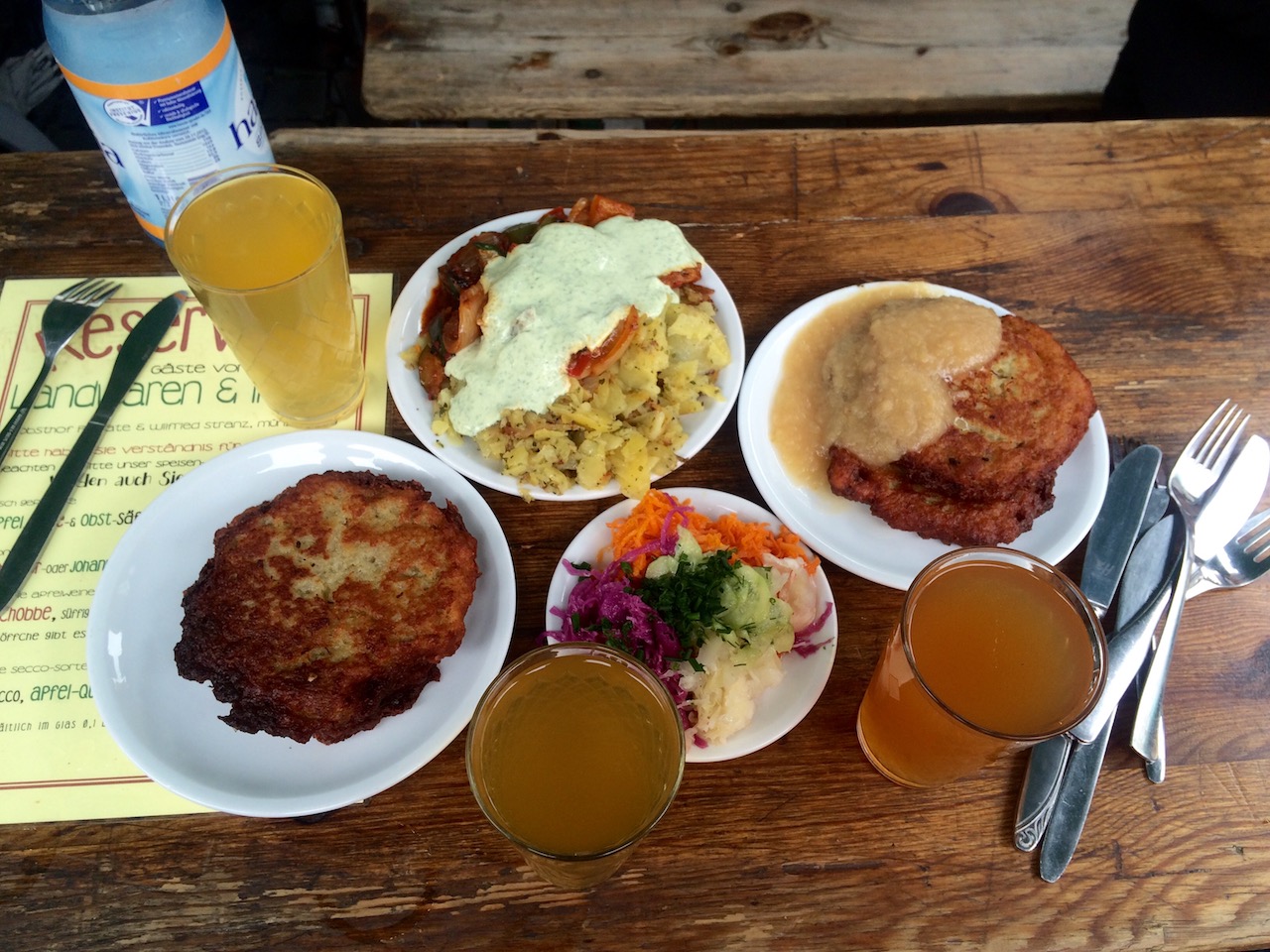NEW destinations bring new thoughts and new foods to savour.
I always wonder whether our tastes change when we’re in a new destination or whether that destination just has better quality food than we are used to at home.
My recent trip to Germany left me with this conundrum, but either way my taste buds were the winner.
I was lucky enough to experience fresh produce from everyday food markets and festivals unique to Germany coupled with a few Michelin star restaurants, and I was in gourmet heaven.
German food is rich, hearty and delicious and many popular German dishes make great comfort food.
Each region has its own specialties and traditional cuisine which changes from one city to the next.
The central city of Frankfurt is known for its green sauce.
This is made from hard-boiled eggs, oil, vinegar, salt, and a generous amount of seven fresh herbs, namely borage, chervil, cress, parsley, salad burnet, sorrel and chives.
The sauce is served with peeled boiled potatoes, accompanying either hard-boiled eggs or roasted beef brisket.
Other dishes which left their mark on me included rippchen, cooked pork served with sauerkraut or schweinshaxe (pig knuckles) that are weighed on the spot and served with mashed potatoes and sauerkraut.

Another dish which was a little lighter included four boiled eggs with gruene sosse or tartarrenbrot, an open-faced sandwich with raw beef, pickles and onions.
Dishes like these have strong regional roots, but German food is more varied than you might think.
Germans are intrepid travellers.
This adventurous side has left its mark and has dramatically changed culinary life over the past 50 years.
In fact, the Germans are among those with the most international range of food in Europe.
The seven million foreigners who live here who brought their foods with them have made important contributions to this development.
Practically every cuisine is represented: Asian and Mediterranean, Turkish and African, Thai, Chinese, Indian and Vietnamese, Greek, Spanish, and Italian, to name a few.
Another major change came with the ‘organic’ movement (which Germans call öko).
Suddenly, people were fascinated with growing their own food. Organic foods can be found almost everywhere.
We got to visit three main cities in Germany including Hamburg, Rüdesheim am Rhein and Frankfurt am Main.
Hamburg is one of Germany’s large cities. It is very liberal and its people demonstrate a strong independent streak.
As I walked along the main streets, the colourful graffiti said it all.
Opposition to the G20 that was held in Hamburg in July 2017 plus several other political causes were represented.
Hamburg was an independent city until German unification in 1871.
Our guide summarised Hamburg simply: “No castles or nobles here in Hamburg. What we have is a harbour… we have two rivers; one for making money (import) and other for spending money (export).”
Rüdesheim am Rhein is a wine region in the Rhine Gorge. It is a land of beautiful hillsides and is a part of the UNESCO world cultural heritage site.
It lies in the Regierungsbezirk of Darmstadt in Hesse – it is officially known as Rüdersheim am Rhein which distinguishes it from nearby Rüdersheim an der Nahe.
This region’s wines are one of the world best known Rieslings.
Frankfurt is Germany’s fifth largest and most international city and has some interesting contrasts.
It’s the financial powerhouse of the country and home to an amazing range of skyscrapers.
There is also much historic architecture.
If you are interested in the history and architecture of the city, the old City Hall and the Saint Bartholomew’s Cathedral are among the most impressive examples.
A population that has a good number of English speakers can be very useful if your skills in the local language are limited, and many Germans take a great pride in being able to speak English well.
I found that most people will respond in English if they realise that your German is not particularly strong.
Germany is the one of the safest countries in Europe.
Crime in Germany is at a very low level, and there is a little risk for travellers when it comes to pickpockets or muggings.
The German people are polite and generous with most happy to help if they spot you are in any difficulty.
The autobahn, a complex highway system, is one of the most famous aspects of German transport, but a good bus network and efficient trains help to make getting around the country easy and painless for travellers.
Traveling by train in Europe is an experience within itself.
It’s relaxing, you can see beautiful parts of the countryside and it can be a great way to meet people.
Our train journey started from Copenhagen and we travelled direct to Hamburg.
While it’s mostly an ideal way to get from place to place, there can be some be some minor hiccups with the system.
Make sure you know exactly what track your train is arriving on and the train number as a train to Frankfurt may arrive 10 minutes before your train to Paris and, before you know it, you’re in Germany.
If you’re ever unsure, there is typically always someone at an information desk around that can help.
For more information on Germany visit www.germany.travel/en